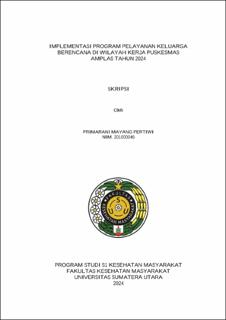| dc.description.abstract | In an effort to curb the population growth rate in Indonesia, which ranks as the fourth most populous country in the world, the government has implemented the Family Planning (FP) program. The family planning service program is also a solution to reduce maternal and child mortality rates and create a healthy and intelligent next generation. Based on data, active FP participants in the working area of Amplas Public Health Center have not shown significant improvement and have decreased compared to the previous year to 32.9%. This study aims to analyze the implementation of the family planning services program in the working area of Amplas Public Health Center. The research utilized a qualitative approach with a descriptive method, conducted from December 2023 to June 2024. The study involved 10 informants interviewed extensively using interview guidelines. The results of the study indicate that Amplas Health Center still faces obstacles in implementing the FP program. In terms of input components, funding for the FP program remains very limited, training of health workers in contraception insertion skills is uneven across healthcare facilities in the operational area, and there are occasional shortages of contraceptive implant stocks at the health center. The process component shows the absence of specific FP program planning, uneven and unscheduled dissemination of information, suboptimal counseling at posyandu, and a reduction in program monitoring quantity. The output component indicates that the FP service program implementation is ongoing but has not significantly impacted the achievement of active FP participants in the health center's working area. It is recommended that the Health Department pay more attention to the FP service program, the health center intensify dissemination efforts and collaborate with family planning field workers (PLKB), and that PLKB strive for equitable dissemination of information in each working area and implement door-to-door methods to support the FP service program implementation | en_US |


